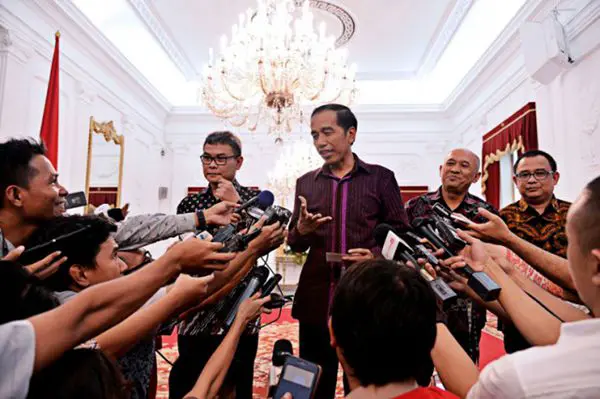(THE JAKARTA POST) The public confidence in President Joko “Jokowi” Widodo’s leadership remains high despite recent scandalous events that highlighted his government's poor performance, an expert has said.
Public policy expert Agus Pambagio said that to improve his image President Jokowi had to be more cautious and clear when communicating his policies as well as more assertive in his leadership.
Agus admitted Jokowi’s communication skills and leadership had improved during the first 15 months of his time in office. Recent incidents of poor coordination among ministries, which destabilized his Cabinet, have been resolved.
“Poor coordination among the ministries was a product of President Jokowi’s first Cabinet reshuffle, which was in fact counterproductive to the President’s efforts to run his government well. It is a duty of Cabinet ministers to assist the President,” Agus told thejakartapost.com on Thursday.
He was commenting on the results of a survey conducted by Kompas daily newspapers’ research department, which found that 84.4 percent of respondents thought Jokowi had done a good job. Most of the respondents said they were impressed by Jokowi’s personal communication style and considered him to have improved the country’s politics and social welfare.
Concerning the current situation, Agus said, Jokowi has to careful in evaluating his Cabinet's performance ahead of his long-awaited second reshuffle. The second shake-up is aimed at supporting his government’s efforts to achieve its development goals and to improve the country’s economy, he added.
“Thus, he must take a firm stance and should be decisive regardless of the consequences,” the expert said.
Agus urged Jokowi to articulate his programs better, while at the same time have his administration pay better attention to what he really wants to achieve. While praising the current administration’s improved performance, Agus criticized Jokowi’s leadership, such as his de-bureaucratizing of several ministries and non-ministry government institutions.
“He wants everything to run fast. Because of problems in his administration, his leadership has led to mal-administration, such as his decision to issue a presidential regulation on the high-speed railway project,” Agus said, adding Indonesia’s bureaucracy had to support the government’s effort to boost the economy.
Agus also highlightedwhat he saw as a poor communication style by President Jokowi, who has not yet dropped his habit of giving off-the-cuff remarks to reporters covering the State Palace and responding to questions posed by journalists through doorstop interviews. According to him, Jokowi should be more careful when issuing statements during doorstop interviews to avoid a slip of tongue.
“It [a slip of tongue] has often happened. Hence, there should be a spokesperson to assist the President,” he said, adding that the appointment of former Corruption Eradication Commission (KPK) spokesman Johan Budi as a presidential spokesperson at the start of this month was the right decision.
Published on Monday and evaluating 15 months of Jokowi’s administration, the Kompas daily survey shows that Jokowi’s image in the public eye has improved dramatically, now at 84.4 percent approval, up 11 percent on his last approval rating in October 2015.
Meanwhile, 72 percent of respondents in the survey considered Jokowi’s administration to have done a good job running its government. That figure is higher than results from most public surveys assessing the Jokowi-Kalla government over the last year.
In general, the survey showed that respondents have been impressed by political and social-welfare progress during Jokowi’s time in office. Over 50 percent of respondents appreciate his political actions so far, especially relating to freedom of speech.
In the fields of social welfare and public service delivery on education and health, again, over a half of respondents were happy with Jokowi's performance.
However, the public’s appreciation in areas of economics and law seems low , with under half of the respondents satisfied. The public's satisfaction when looking at the government’s controlling of food prices and the rupiah exchange rate and its creation of employment.
Meanwhile, more than half of the respondents appreciated the government's empowerment of farmers and fishermen, its traditional-market development and equitable development stratgey, the survey said.
 简体中文
简体中文





